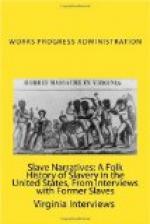“Sometimes Negro slave runaways who were apprehended by the patrollers, who kept a constant watch for escaped slaves, besides being flogged, would be branded with a hot iron on the cheek with the letter ’R’.” Simms claimed he knew two slaves so branded.
Simms asserted that even as late as 1856 the Constitution of Maryland enacted that a Negro convicted of murder should have his right hand cut off, should be hanged in the usual manner, the head severed from the body, divided into four quarters and set up in the most public places of the county where the act was committed. He said that the slaves pretty well knew about this barbarous Maryland law, and that he even heard of dismemberments for atrocious crimes of Negroes in Maryland.
“We lived in rudely constructed log houses, one story in heighth, with huge stone chimneys, and slept on beds of straw. Slaves were pretty tired after their long day’s work in the field. Sometimes we would, unbeknown to our master, assemble in a cabin and sing songs and spirituals. Our favorite spirituals were—Bringin’ in de sheaves, De Stars am shinin’ for us all, Hear de Angels callin’, and The Debil has no place here. The singing was usually to the accompaniment of a Jew’s harp and fiddle, or banjo. In summer the slaves went without shoes and wore three-quarter checkered baggy pants, some wearing only a long shirt to cover their body. We wore ox-hide shoes, much too large. In winter time the shoes were stuffed with paper to keep out the cold. We called them ‘Program’ shoes. We had no money to spend, in fact did not know the value of money.
“Our food consisted of bread, hominy, black strap molasses and a red herring a day. Sometimes, by special permission from our master or overseer, we would go hunting and catch a coon or possum and a pot pie would be a real treat.
“We all thought of running off to Canada or to Washington, but feared the patrollers. As a rule most slaves were lazy.”
Simms’ work at Contee was to saddle the horses, cut wood, and make fires and sometimes work in the field.
He voted for President Lincoln and witnessed the second inauguration of Lincoln after he was set free.
Maryland 12/6/37 Rogers
Jim Taylor (uncle Jim), Ex-slave.
Reference: Personal interview with Jim Taylor,
at
his home, 424 E. 23rd St., Baltimore.
“I was born in Talbot County, Eastern Shore, Maryland, near St. Michaels about 1847. Mr. Mason Shehan’s father knew me well as I worked for him for more than 30 years after the emancipation. My mother and father both were owned by a Mr. Davis of St. Michaels who had several tugs and small boats. In the summer, the small boats were used to haul produce while the tugs were used for towing coal and lumber on the Chesapeake Bay and the small rivers on the Eastern Shore. Mr. Davis bought able-bodied colored men for service on the boats. They were sail boats. I would say about 50 or 60 feet long. On each boat, besides the Captain, there were from 6 to 10 men used. On the tugs there were more men, besides the mess boy, than on the sail boats.




